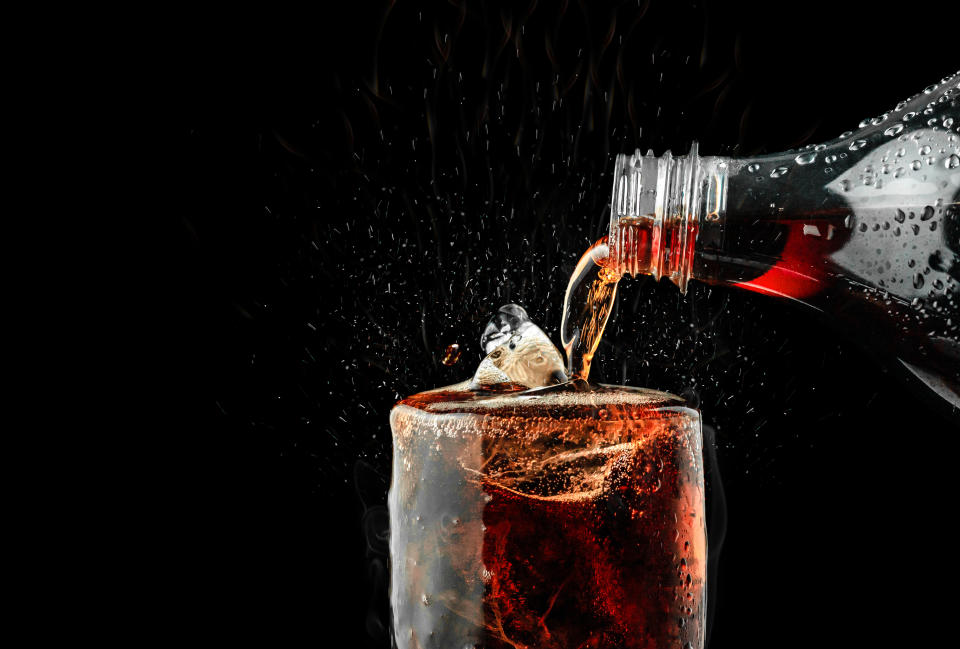Sugar in soft drinks plummets by nearly a third in three years

The amount of sugar in soft drinks sold in the UK has fallen by nearly a third, research suggests.
Scientists from the University of Oxford analysed the nutritional information of more than 7,000 sodas, juices, energy and sports drinks, and bottled water products.
They found the total amount of sugar in soft drinks went down by 29% between 2015 and 2018.
READ MORE: 10 surprising foods full of hidden sugar
Sugary sodas have often been blamed for the UK’s obesity problem, particularly among children.
Nearly a third (29%) of adults in England were obese in 2017, NHS Digital statistics show.
When it comes to children, one in five (20%) of those in year six - aged 10-to-11 - were carrying dangerous amounts of weight in 2017/18.
Surveys have shown the consumption of “free sugars” - those added to food or drink - in the UK is more than double guidelines for adults and nearly triple for children, the scientists wrote in the journal BMC Medicine.
READ MORE: The royals drink their tea sweetened with honey rather than sugar
In an attempt to combat this, the British government introduced the Soft Drinks Industry Levy (SDIL) in April 2018.
The “standard rate” of 18p ($0.24) per litre applies to drinks with a sugar content of between 5g and 7.9g per 100ml, according to HM Revenues & Customs.
“Higher rates” lead to charges of 24p ($0.31) per litre for drinks with 8g or more sugar per 100ml.
To uncover how the SDIL has been implemented, the Oxford scientists combined the nutritional information of a wide range of soft drinks with the sales data of 195 brands from 57 companies.
Among the top 10 firms, eight reduced their sugar content by at least 15%.
Average consumption of the sweet stuff fell from 4.4g/100ml in 2015 to 2.9g/100ml three years later.

“This study is not designed to evaluate the specific effects of the SDIL, but nonetheless shows sustained pressure on business, including using fiscal measures, has led to a striking reduction in the sugar content of soft drinks in the UK,” lead author Lauren Bandy said.
Nearly three-quarters (73%) of the sugar reduction was due to the reformulation of existing products or the introduction of less-sweet alternatives.
The remaining 27% was put down to a change in buying habits.
“It is encouraging to see such a large reduction in sugars sold in soft drinks,” Ms Bandy said.
“These changes are likely to be due to a combination of government action, mostly through the SDIL, changes in marketing practices on the part of the soft drinks industry and greater awareness of the harms caused by sugary drinks amongst consumers.
“They show it is possible for improvements in public health to be consistent with successful business practices.”
READ MORE: Asda to remove cartoon characters from cereal boxes to tackle childhood obesity
Yet, it was not all good news.
The two biggest companies - Coca Cola and Britvic - reduced the total quantity of sugars across all their drinks by 17% and 26%, respectively.
When it came to their “flagship” sodas - the Coca Cola drink itself and Pepsi - however, levels of the sweet stuff remain unchanged.
Coca Cola is also behind Dr Pepper, Appletiser and Fanta, while Britvic makes Robinson’s, Lipton ice tea and the sports drink Mountain Dew.
The sugar content of Innocent smoothies and Red Bull energy drinks had “little change”, with sales going up.
Smoothies have a healthy reputation, but can pack a big sugar hit.
Blending fruit causes natural sugars to be released from its cell walls, turning them into “free sugars”, according to the British Heart Foundation.
Free sugars, which include the “bad” white stuff, can lead to weight gain and tooth decay.
The scientists hope their results will encourage the government to take further action to tackle obesity.
“National and international governments are calling for change in the food industry to improve public health,” study author Professor Susan Jebb added.
“This new method allows researchers to monitor the progress being made and to make this information available to the public.
“This external scrutiny will hopefully encourage more positive and rapid action by the food industry to achieve healthier diets.”

 Yahoo Lifestyle
Yahoo Lifestyle 
